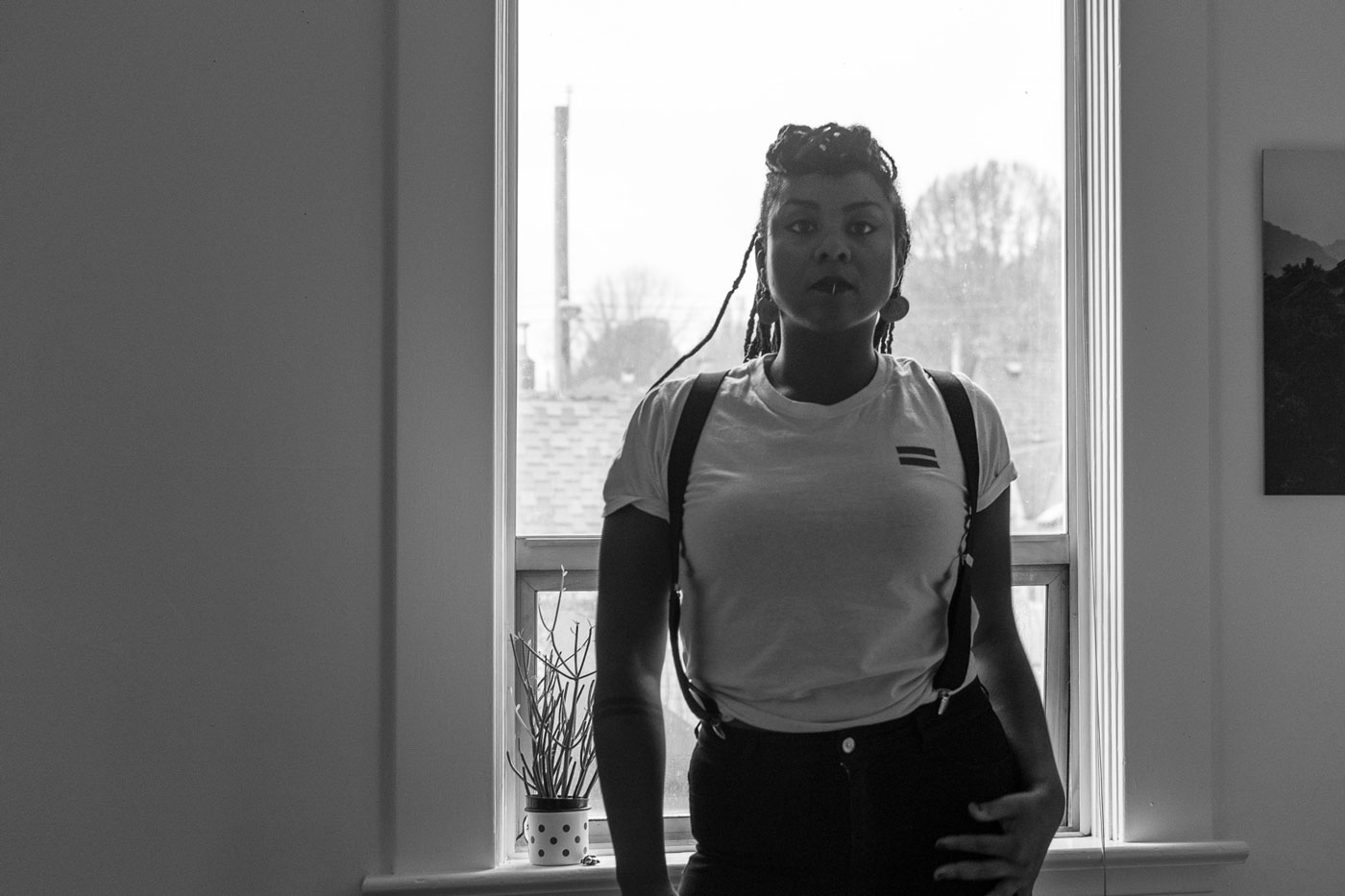“But all our phrasing—race relations, racial chasm, racial justice, racial profiling, white privilege, even white supremacy—serves to obscure that racism is a visceral experience, that it dislodges brains, blocks airways, rips muscle, extracts organs, cracks bones, breaks teeth…. The economics, the graphs, the charts, the regressions all land, with great violence, upon the body.”
—Ta-Nehisi Coates, Between the World and Me
***
It’s raining as I write this, but there’s a coldness to this city that runs deeper than the weather. I’m thinking of what it feels like to walk down the street in my brown body even on those sunny Coast Salish days that make rain difficult to remember.
Taking time to greet me before going in and to offer thanks during our conversation, Ruby Smith-Díaz is warm in her approach, the way she reaches out and the way she seems to warm up a question before responding to it. Our “interview” took place over text message — she lives in a wifi-free apartment — about her community-based entrepreneurial work, passions and art.
We conversed between her training clients and working on getting out the next round of shirts for Autonomy Personal Training. Between helping plan a fundraiser for the Tiny House Warriors, taking shifts at a local coffee truck, and preparing an Afro futurism workshop for local colleges and universities through Tierra Negra Arts. Between reading and researching and spending a bit of time with friends and her partner. Between checking out shows and working on new musical concepts. Between taking care of self and home and stopping for a bit to help with banner making for Community Not Cops, Anti-Police Power rally in Surrey.
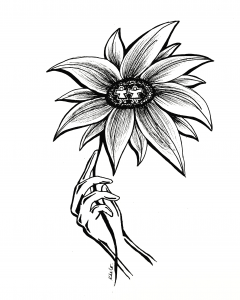
Born to Chilean and Jamaican parents in Edmonton- amiskwacîwâskahikan (ᐊᒥᐢᑿᒌᐚᐢᑲᐦᐃᑲᐣ), she graduated from the University of Alberta with a degree in Education with distinction and, while having recently returned to teaching, is multiply an artist. She has dabbled in screen printing, poetry, spoken word, drawing, costume design, visual art, singing and looping over the last decade. As much as possible, she says, “I’m trying not to [feel] the need to ‘perfect’ one specific art.
Right now, listening to her current project, Eclipse, whose music she makes by looping samples, her voice, and banjo and bass, I feel a certain urgency. And yet the variations in the sound and tonality of the songs speak to a steeping of years, to the tension of finding passion in the city and breath in breaks outside it, and to her breadth of political and musical influences, a breadth that Smith-Díaz has turned into a gift, “I’m influenced politically by the works of the late Arthur Manuel, the works of Sonya Renee Taylor and Stokely Carmichael, among others. In terms of my own practice, the influences are from everywhere: Afro Cuban hip hop band Obsesión, Death (black Detroit punk), Anti Product (anarchist US POC punk), Dystopia (sludgey crust punk), Gil Scott Heron, Buffy Sainte-Marie…”
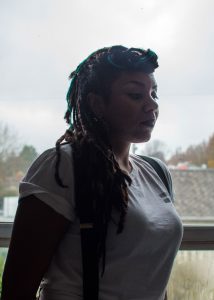
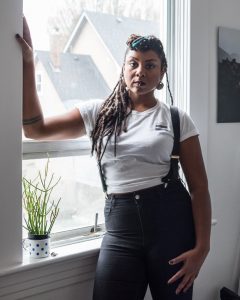
There is danger in the narrative of the black woman as super-shero, the danger of expectation. In her communication, Ruby is real about her capacity, clear, yet gentle. I first met Ruby Smith-Díaz through the overlaps in our facilitation, activism and artist communities. Her journey is one I am grateful to be witnessing, sometimes from afar, sometimes from closer, always implicating herself, drawing on what she’s learned and imagining what has been denied her and others.
“Whether in organizing spaces, a gym or being out on the town with friends, we are deeply impacted by how we are perceived in our bodies, because of the way that our bodies carry our identities and in the way that we are politicized, because of our bodies.”
It’s clear that Ruby Smith-Díaz approaches both life and work with reflective passion, “This matters to me because I am one of those bodies that receives harm, because I am black, because I identify as a woman, because of [my body’s] shape at different points in my life and because of who I’m attracted to. I’ve been on the receiving end of violence so many times that I’m determined to not have a single person more experience the things that I went through.”
She finds deep connections between her personal training work and her workshop facilitation, both of which require folks to reflect on themselves and the words they interact with in deep ways, “I’m seeing more than ever that the lines of work are so close. This means also taking a look at how our society and the state in so many ways replicate harm or as black feminist writer, Sonya Renee Taylor has expressed, ‘body terrorism’ upon those bodies who fall outside the norm.”
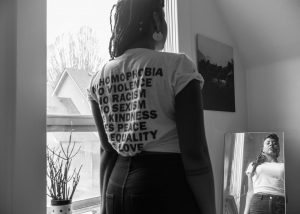
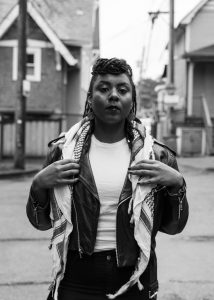
For Smith-Díaz, too many folks have faced mockery, violence and exclusion, have stopped going to gyms or never felt comfortable entering them, let alone seeking out a personal trainer, “So I deal with [body terrorism] from the moment we sit down, speaking to my own journey and my body, letting them know there won’t be any diet talk, no callipers and scales.
“Rather than reinforcing white supremacist, patriarchal, cis heteronormative beauty standards, I remind them they have full agency to tell me how they want their body parts to be called, the pronouns they’d like for me to use for them and the goals they would like to work towards.
“Because they haven’t seen bodies like theirs represented in the media, doing the things that other bodies do, people often underestimate their strength … I’m often finding myself coaching folks to trust themselves and reminding them that they are strong and that they can do it. So really, my work is to challenge body terrorism in all of its realms and help catalyze healing justice for the communities I work with … especially Indigenous, racialized and trans, non binary or queer folks.”
When she speaks about the shift that Autonomy clients experience — reduction in body pain, changes to how they carry themselves, more intimate relationships to movement at all, she does so with gratefulness, wondering “how many more people want to move their bodies, but can’t, because of how our society terrorizes those bodies that don’t fit the ‘norm.’” Her words remind me how often I have heard folks close to me express not just shame in relation to their bodies, but grief as well.
When Ruby responded to my question about patterns of hurt in her own life, the specific ways that racism and gender violence operate, are all too clear, “It looks like having cops slow down when I stand anywhere in public. It looks like getting yelled “nigger” from passing cars. Or having my name run to border services after getting stopped on the street, because I’m black, because I pronounce my last name like I’m from somewhere else.”
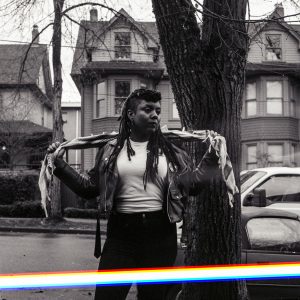
When she responded to my question about how she grounds herself in the daily, I experienced the same closing of distance as when she spoke of her different forms of work: “songs of the Orishas, moving my body, leaving Canada and visiting my families’ homelands, visiting predominantly black cities and seeing shows by black artists, speaking Spanish with friends when I can, laughing, talking to old friends who have seen me through the best and the worst and hold pieces of my brilliance even when I can’t see it.” For Ruby, the art and activism she is called to do is never far from the space and time she is attempting to move through.
“As black feminist writer and visionary, adrienne marie brown speaks in her work, we often come to social movements seeking justice, because we’ve often experienced some sort of hurt ourselves somewhere in the past. But we don’t acknowledge it. And if we don’t acknowledge it and look at the place where we have the most agency in our lives (our words, our thoughts, our actions), then we are missing an opportunity to shift things towards justice.” She notes how folks who come to her Tierra Negra workshops are sometimes surprised to find themselves talking about their stories or drawing or laughing, “That’s the beautiful thing about art. It’s disarming. It opens a door to talk about the deeper stuff in a more profound way.”
Ruby Smith-Díaz believes that radical shifts happen in the closeness of sitting with ourselves. While the resources she shares on her Autonomy website clearly show that she sits with herself and does her research, this also shows up in the the fullness of her being beyond the work she does. I think of how she connects to the joyous things that pull her, how the way she took up her own fitness practice reminds me of how she took up bicycle polo with a crew of fellow women, “I wanted to for a while and finally just actually got into it.”
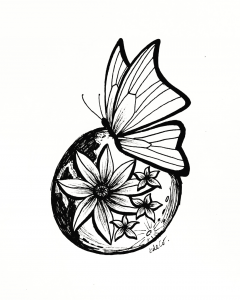
For Smith-Díaz, her commitment to DIY ethic — as well as her approa ch to creative practice and her musical sound with Eclipse — has largely been informed by being a “recovering punk.”
There is tension here, contradiction she finds a way to carry. “It looks like going to a show by a band I’ve been looking forward to for months and then dealing with the slow creep anxiety of having to look at people’s patches to see if they’re NaZi skinheads or SHARPS. Or, finding out that the band has white nationalist lyrics in their latest albums.”
“I remember being in the 9th grade and coming across AntiFlag. I didn’t have many friends and I just remember sitting in my social studies class the day after I listened to them and being angry at all the things we weren’t being taught. And everything made sense to me. The songs — especially “Angry Young and Poor” and “Die For Your Government”— gave me so much fuel to not want to fit into the status quo. I got so much comfort in that.
“[Punk] was a huge part of my life during my teen years and early adulthood and it is truly what helped me get through my feelings of isolation, depression and self hatred during my teen years. Because I attended predominantly white and wealthy schools, I found myself often being the odd one out, being the target of bullying because I couldn’t afford to wear the latest brands and I didn’t have long straight blond hair, and wasn’t skinny like the other popular girls.
So, when I found punk music I fell in love. It was like a long lost love that affirmed so many aspects of my being and gave me the confidence to say fuck you, and your beauty standards. I’m gonna wear what I want and the weirder, the better, and I don’t even have to try to look like you.
Punk gave me the impetus to start looking into more radical politics and gave me a class analysis to make sense of the world around me. Even though the scenes were often predominantly white and, at times, openly racist, I still found a lot of who I am today in punk and created space for my Afro Latina-ness to be another unique marker that didn’t have to fit into the mainstream.”
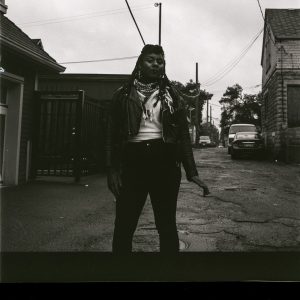
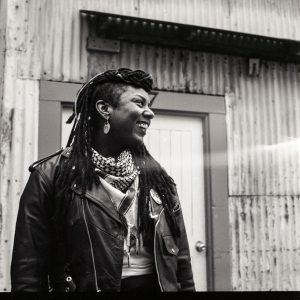
When she speaks on her Afro Latina-ness, I think about how we name ourselves. Also, I have been thinking a lot about naming, especially since first hearing these words from the title poem of Eritrean Puerto Rican African American / Black Latinx poet Aracelis Girmay’s The Black Maria: “Naming, however kind, is always an act of estrangement. (To put / into language that which can’t be / put.) & someone who does not love you cannot name you right, & even “moon” can’t carry the moon…”
I asked Smith-Díaz about her process of naming Autonomy Personal Training and Tierra Negra Arts. She responded, “I’m so intrigued by that quote actually! In terms of the naming process, I wanted both to evoke a sense of dignity.
“Tierra Negra in Spanish means black earth, so Black Earth Arts to me represents the untold, obscured and misrepresented histories of struggle and resilience of black communities and, most importantly, my ancestors.
“We have made survival an art and we have made it beautiful though it’s emergence has often come at a very high cost; the learnings, the imaginings, the visioning into a healing justice world are all things I wanted to represent in the name, because they are a part of my work.
“For Autonomy, I wanted a strong name that cited the body as a site of resistance and self determination. So many anarchist, Indigenous, and anti authoritarian communities around the world hold Autonomy and self determination as founding principles as a means to fighting colonial and state violence and I really wanted to bring those concepts into my work and, more importantly, into the bodies of my clients.
“For so long under white supremacist, capitalist, patriarchal and ableist systems, we’ve been told that our bodies can’t exist as they are. We are constantly told that they must be shaped into “bigger,” “smaller,” “more feminine”, “not disabled”—and all of this serves a purpose to not only to demoralize us, but to also demoralize us to a point of desperation to buy products so we can become all the things we are told that we aren’t. I don’t believe anyone should feel shame about their bodies, nor that anyone should hold the power to dictate what our bodies should look like or do. We all deserve body autonomy.
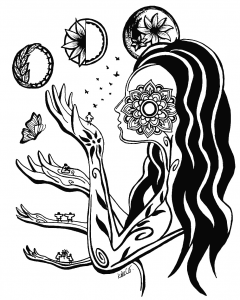
I’m outside in a rain softened by city’s evening fall, looking back through my conversation with Ruby Smith-Díaz, hearing her typed words as if spoken, remembering a poem by Lucille Clifton, a poem I have often needed through the years. What follows is not quite a poem, but the poetics that I believe follows when I reflect on Ruby’s approach:
May you find yourself in relation to your own body, activating the movement, the work you love, free from the gazes that try to place you caught.
May you find the music you need, the energy you need. Your community is one you build, and one that reaches you from beyond the memory and future of this realm.
And may you realize your strength, your capacity is higher than you think. And may you know you get to say when you have reached it.
May what you desire to grow also find you: in lyrics and vision, in breathable air and love.
May they live in your body, helping you dislodge the sources of your doubt, release the terrorisms even now trying to seep back in.
Here, your body, with which you imagine: it is yours to call, it is finally and always was yours.
—after Ruby Smith-Díaz, after Lucille Clifton’s “blessing the boats”
***


